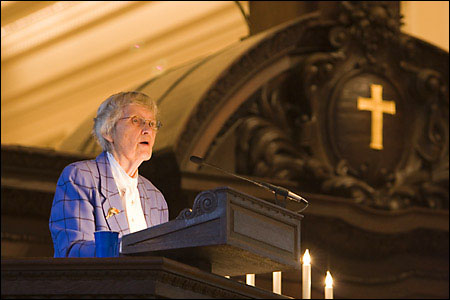Use differences to unite, not divide, says Tillich lecturer
Theologian Russell wants to turn biblical ‘hospitality’ into social activism

Russell, professor of theology emerita from Yale Divinity School, said there is a long history of humans fearing “the other,” those that are different from themselves. In some ways, those fears stem from real events, she said, fed by international terrorism, for example, or by jobs being sent overseas or taken by workers from another ethnic group toiling for lower wages.
But social structures and some national leaders fan the fears of the other and emphasize the danger in difference. This creates a world where those who have riches and wealth fear to reach out to those who don’t, widening the divide between people and worsening the world’s inequalities.
But difference needn’t be divisive, Russell said. Several religious traditions, including Christianity, Judaism, and Islam, all teach that it’s important to be kind to strangers and to extend hospitality to them.
That concept of hospitality, she said, can be the foundation of a new effort to reach across group boundaries. People should reach out to those different from themselves, those who may be less fortunate, and offer them a new, deeper hospitality that extends beyond offering a meal or housing. Hospitality should include standing with them to shake up the social structures that keep people apart, that keep certain groups from sharing in the benefits of society.
“Our struggle is to overcome the fear of difference and to break the bars that keep us apart,” Russell said. “[Others] want what we want. They want to work, they want to change the social structure. They want hospitality with justice.”
Russell spoke at the Memorial Church Tuesday evening, delivering the annual Paul Tillich Lecture. Sponsored by the Memorial Church and Harvard Divinity School, the Tillich Lecture commemorates University Professor Paul Tillich, an internationally renowned theologian who taught at Harvard from 1955 through 1962.
Russell was introduced by Dorothy Austin, Sedgwick Associate Minister in the Memorial Church, Associate Divinity School Dean Mark Edwards Jr., and by Ann Braude, senior lecturer on American religious history and director of the Women’s Studies in Religion Program.
Braude said Russell’s presence is appropriate given that this year marks the 50th anniversary of Tillich’s first year as a professor here, the 1955-56 academic year. Russell was a member of Harvard Divinity School’s first class that admitted women that same year and studied under Tillich, Braude said.
After leaving Harvard, Russell returned to East Harlem Parish where she worked before enrolling at Harvard. She was ordained as a Presbyterian minister and became the pastor of the Presbyterian Church of the Ascension. While working in East Harlem, Russell also attended Union Theological Seminary and taught theology for five years at Manhattan College. She joined Yale Divinity School in 1974, where she served until 2001.
Braude said Russell’s 1974 book, “Human Liberation in a Feminist Perspective – A Theology,” proved groundbreaking, saying, “the book was everywhere, and so was Letty.” Braude said Russell characterized her own work during an earlier visit to Harvard by saying she tries to answer the questions: “Who is missing from the table? Whose voice is not yet being heard?”
On Tuesday, Russell was critical of the U.S. government, saying in response to a question from the audience that fear of the other is used “tremendously” by our government and others in the modern world to divide people. Those who disagree with what the government is doing need to work to elect new leaders, she said.
Russell said that people should look at differences as a gift. She cited the Bible’s story of creation where God sees what Russell described as the “riotous difference” just created – birds and plants and fish – and pronouncing it “good.” Genesis’ diversity of creatures on the Earth should be extended to the differences within humanity, Russell said.
The challenge for all of us, she added, is how to create nations, communities, churches, and campuses that celebrate the very differences that have been used to divide us.
“Difference can be a gift to our pluralistic world,” Russell said.




